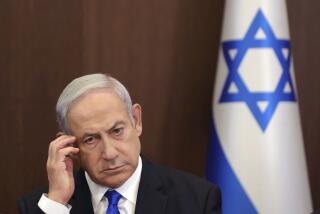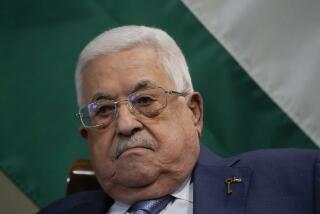Abbas to Name a Deputy After Hint of His Mortality
JERUSALEM — Palestinian Authority President Mahmoud Abbas, who returned to the West Bank after undergoing a coronary procedure in Jordan, expressed willingness Friday to appoint a deputy and potential successor.
Abbas’ comments reflected a degree of concern, his own and others’, about the 70-year-old leader’s health, but his attitude was striking mainly for its contrast to the behavior of his predecessor, Yasser Arafat.
Arafat, who died in November, jealously guarded his power and fiercely resisted all urging to designate a successor. Over the years, the veteran leader systematically undermined anyone in his inner circle who seemed to be gaining a popular following.
Abbas, returning to his Ramallah headquarters on Friday from Amman, the Jordanian capital, told reporters in response to questions that he had been considering appointing a deputy since his election in January.
“This is a subject of vital importance,” he said. “If we are to depend on institutions, such a post should be created.”
Separately, Abbas told the satellite television channel Al Arabiya that having a deputy was a “vital and useful idea.”
“If fate approaches, we do not wish to see any disorder or lack of continuity,” he said.
Such an appointment would need the approval of the Palestinian parliament. Abbas gave no indication of whom he might be considering for the post or when he might act on his decision.
“God willing, it will be executed at the earliest possible date,” he told Al Arabiya.
Abbas checked into an Amman hospital Wednesday. At the time, family members and a senior aide, Tayeb Abdel Rahim, described the late-night procedure he underwent as an angioplasty, in which a tiny balloon is used to open a blocked vein or artery.
But Palestinian officials subsequently said he had instead undergone a coronary angiogram, a primarily diagnostic procedure in which a catheter is threaded into vessels near the heart.
Abbas said afterward that his health was fine and no coronary obstruction had been found. His eldest son, Mazen, died of a heart attack in his 40s, an event that associates have said haunts Abbas.
The Palestinian leader’s plan to appoint a deputy raised renewed speculation about his relationship with Prime Minister Ahmed Korei, with whom he has quarreled in the past. Their dealings of late have been described by aides as cordial but tense.
Any deputy appointed by Abbas would not automatically assume power upon his death. By law, the presidency would temporarily be filled by the speaker of parliament, as it was after Arafat died. However, such a show of confidence by Abbas would probably serve as a political springboard.
Abbas could also opt to make the appointment a largely symbolic one, giving the deputy no real responsibility while benefiting from the goodwill of that person’s constituency. For example, he could pick the jailed Marwan Barghouti, a popular leader of the intifada who had flirted with the idea of contesting the presidency. Or he could choose Farouk Kaddoumi, a PLO hard-liner in exile who leads Abbas’ Fatah faction.
When word of his hospitalization emerged, Abbas received good wishes from leaders all over the world -- including Israeli Prime Minister Ariel Sharon. Sharon telephoned Abbas on Friday and “wished him a quick recovery,” the prime minister’s office said.
The two sides announced this week that Abbas and Sharon planned to meet June 21 in their first encounter since a Feb. 8 summit in Egypt. The venue has not been finalized, but Israel has reportedly invited the Palestinian leader to come to Jerusalem.
Sharon, like Abbas, has been buffeted by domestic political discontent. A poll published Friday by the Maariv newspaper indicated that public support for Sharon’s plan to withdraw from the Gaza Strip this summer had fallen to 50%, the lowest reading since the pullout plan was unveiled 18 months ago.
However, the survey suggested that the ranks of the undecided were growing, rather than avowed opponents of the withdrawal. The number of respondents saying Israel should not relinquish Gaza remained fairly steady at 38%.
Abbas, for his part, is faced with the growing political clout of the Islamist group Hamas, which has fared well in municipal elections since Arafat’s death. Hamas has said it will field candidates in parliamentary elections, scheduled in mid-July but likely to be delayed amid procedural disputes.
Special correspondent Maher Abukhater in Ramallah contributed to this report.
More to Read
Sign up for Essential California
The most important California stories and recommendations in your inbox every morning.
You may occasionally receive promotional content from the Los Angeles Times.










